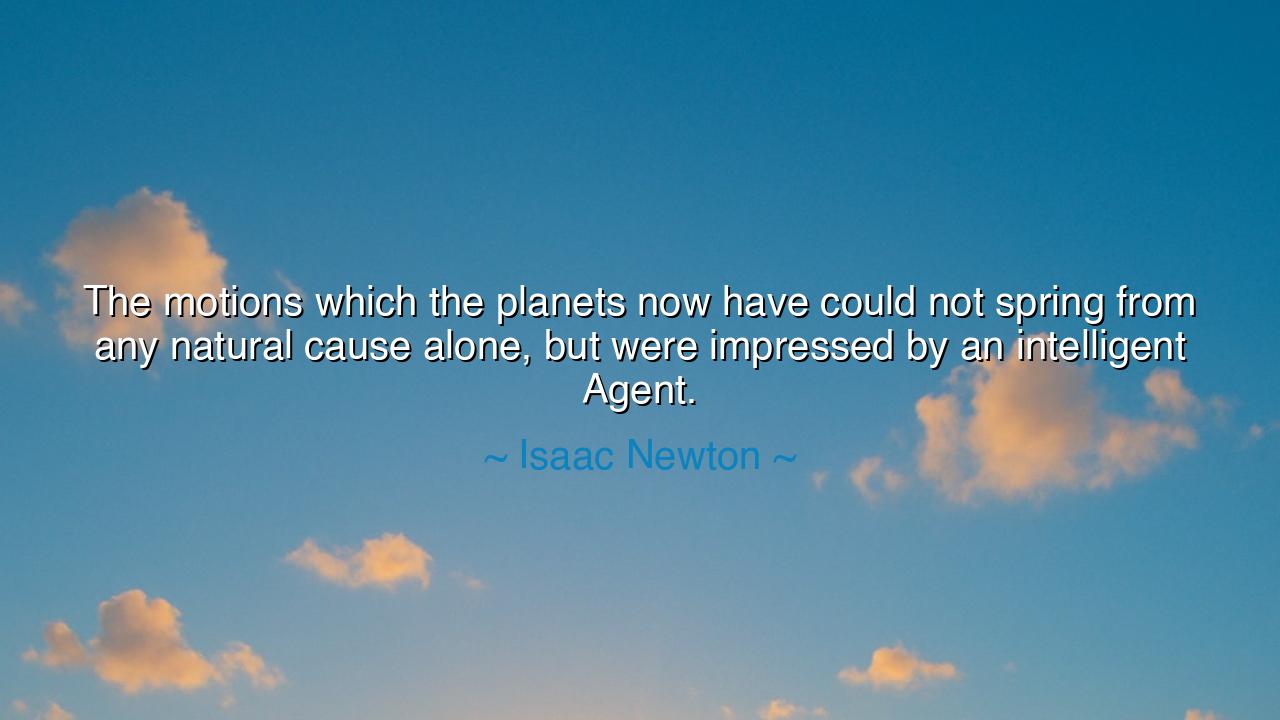
The motions which the planets now have could not spring from any
The motions which the planets now have could not spring from any natural cause alone, but were impressed by an intelligent Agent.






The words of Isaac Newton — “The motions which the planets now have could not spring from any natural cause alone, but were impressed by an intelligent Agent.” — resound through the ages like a hymn to both reason and reverence. They were spoken by a man who gazed into the vastness of the heavens and saw not chaos, but order, not accident, but intention. In this statement, Newton, the father of modern physics, reveals the heart of a truth that transcends time: that behind the laws of nature lies mind, and behind the motion of the stars lies meaning. Though he was a scientist who sought to explain the workings of the universe through observation and mathematics, he was also a philosopher of wonder, who believed that science did not disprove the divine — it illuminated it.
The origin of this quote lies in Newton’s monumental work, Philosophiæ Naturalis Principia Mathematica, published in 1687, where he unveiled the laws of motion and universal gravitation. Through his equations, he showed that the same invisible force which draws an apple to the Earth also binds the planets to the Sun. Yet even as he laid bare the mechanics of the cosmos, he saw in its harmony a mystery that science alone could not explain. To him, the precise balance of planetary orbits, the dance of worlds around the Sun, was not the product of chance or blind necessity. It was the signature of a cosmic intelligence, a divine Architect whose wisdom sustained the order of creation. For Newton, science and faith were not rivals, but companions — reason was the instrument, and God, the composer.
In these words, Newton affirms a truth known to the ancients: that the universe is not a random motion of dust, but a living symphony of purpose. The Greeks had called this intelligence Logos, the divine reason that ordered all things. The medieval philosophers spoke of it as the Prime Mover, the First Cause who set the stars in their courses. Newton, inheriting this lineage, translated the mystery into the language of mathematics, yet found himself still standing before the same awe — that the universe is too precise, too elegant, too finely tuned to be an accident. Thus, even at the height of rational discovery, he bowed to wonder and declared: an intelligent Agent must have impressed these motions.
This belief was not superstition, but humility — the humility of a mind that, having measured the stars, still recognized the limits of its reach. Newton once said, “I do not know what I may appear to the world, but to myself I seem to have been only like a boy playing on the seashore... finding a smoother pebble or a prettier shell than ordinary, while the great ocean of truth lay all undiscovered before me.” Here, in this confession, we see the spirit behind the quote. For even as he discovered the mathematical tides of the universe, he felt the presence of the infinite, the intelligence beyond comprehension. The laws he uncovered were, in his view, the handwriting of the Creator — proof that reason itself was divine.
Consider the story of Johannes Kepler, Newton’s predecessor, who also sought to understand the heavens. After years of study, when he discovered that planets moved in ellipses rather than perfect circles, he was not dismayed but awed. He wrote, “I was merely thinking God’s thoughts after Him.” Like Newton, Kepler saw no division between discovery and devotion. The pursuit of truth was, to him, an act of worship. Newton carried this same spirit further, showing that even as we master nature’s laws, we are reading the scripture of creation — the revelation of an intelligent order woven through all things.
There is a deep lesson in Newton’s words for the modern soul, which often seeks knowledge without wisdom, progress without reverence. We live in an age that measures the stars but forgets to marvel at their light. Newton reminds us that understanding the mechanism does not erase the mystery; it magnifies it. To see how gravity moves the planets is not to diminish the wonder of their motion, but to glimpse the brilliance of the mind that made it possible. Thus, whether one names it God, Nature, or the Universe, the wise recognize that the harmony of existence is not a coincidence — it is a calling to gratitude, curiosity, and awe.
The lesson, then, is this: seek knowledge with humility and wonder. Study the world not to conquer it, but to commune with it. When you look upon the stars, the forests, or even the atom, do not see only patterns and equations — see the reflection of a greater intelligence that shaped them. Let your reason lead you not to pride, but to reverence. As Newton teaches, the highest wisdom is not merely to know the laws of nature, but to sense the divine harmony that breathes through them.
So, O seeker of truth, remember Newton’s vision: the motions of the planets were impressed by an intelligent Agent. Knowledge and faith are not opposites — they are twin lights illuminating the same path. Look upon the universe not as a machine to be mastered, but as a miracle to be understood. And when you stand beneath the night sky, feeling small before its vastness, remember: that same intelligence which moves the stars also moves within you — and your search for truth is itself a reflection of the eternal mind that set the cosmos in motion.






AAdministratorAdministrator
Welcome, honored guests. Please leave a comment, we will respond soon